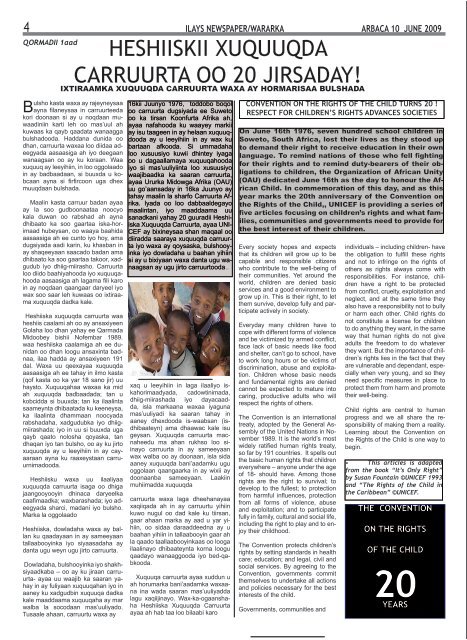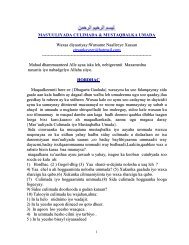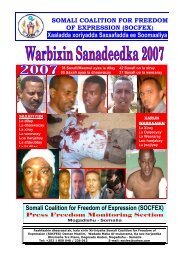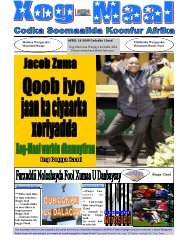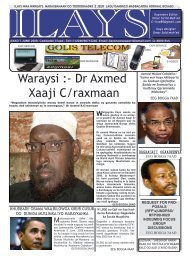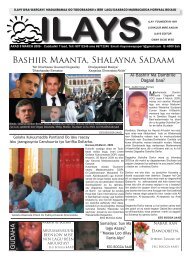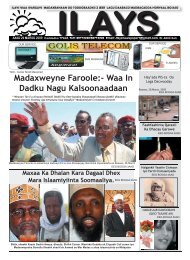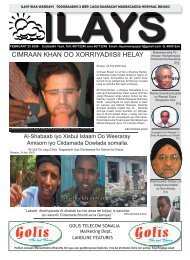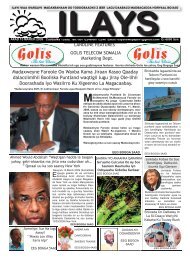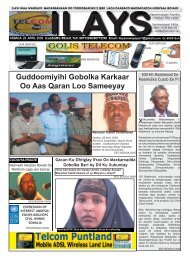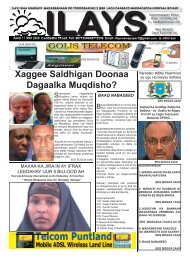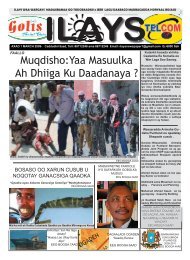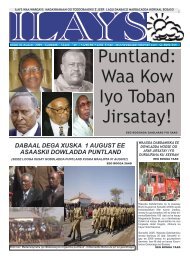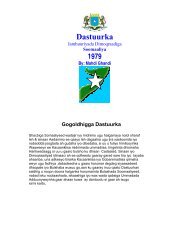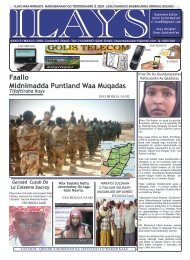Shidaal Baarista Puntland - Somali Talk
Shidaal Baarista Puntland - Somali Talk
Shidaal Baarista Puntland - Somali Talk
You also want an ePaper? Increase the reach of your titles
YUMPU automatically turns print PDFs into web optimized ePapers that Google loves.
4 ILAYS NEWSPAPER/WARARKA ARBACA 10 JUNE 2009<br />
QORMADII 1aad<br />
HESHIISKII XUQUUQDA<br />
CARRUURTA OO 20 JIRSADAY!<br />
IXTIRAAMKA XUQUUQDA CARRUURTA WAXA AY HORMARISAA BULSHADA<br />
Bulsho kasta waxa ay rajeyneysaa<br />
ayna filaneysaa in carruurteeda<br />
kori doonaan si ay u noqdaan muwaadiniin<br />
karti leh oo mas’uul ah<br />
kuwaas ka qayb qaadata wanaagga<br />
bulshadooda. Haddana dunida oo<br />
dhan, carruurta waxaa loo diidaa adeegyada<br />
aasaasiga ah iyo deegaan<br />
wanaagsan oo ay ku koraan. Waa<br />
xuquuq ay leeyihiin, in loo oggolaado<br />
in ay badbaadaan, si buuxda u kobcaan<br />
ayna si firfircoon uga dhex<br />
muuqdaan bulshada.<br />
Maalin kasta carruur badan ayaa<br />
ay la soo gudboonaataa noocyo<br />
kala duwan oo rabshad ah ayna<br />
dhibaato ka soo gaartaa iska-horimaad<br />
hubeysan, oo waaya baahida<br />
aasaasiga ah ee cunto iyo hoy, ama<br />
dugsiyada aadi karin, ku khasban in<br />
ay shaqeeyaan saacado badan ama<br />
dhibaato ka soo gaartaa takoor, xadgudub<br />
iyo dhiig-miirasho. Carruurta<br />
loo diido baahiyahooda iyo xuquuqahooda<br />
aasaasiga ah lagama fili karo<br />
in ay noqdaan qaangaar daryeel iyo<br />
wax soo saar leh kuwaas oo ixtiraama<br />
xuquuqda dadka kale.<br />
Heshiiska xuquuqda carruurta waa<br />
heshiis caalami ah oo ay ansaxiyeen<br />
Golaha loo dhan yahay ee Qarmada<br />
Midoobey bishii Nofembar 1989.<br />
waa heshiiska caalamiga ah ee dunidan<br />
oo dhan loogu ansaxinta badnaa,<br />
ilaa hadda ay ansaxiyeen 191<br />
dal. Waxa uu qeexayaa xuquuqda<br />
aasaasiga ah ee tahay in ilmo kasta<br />
(qof kasta oo ka yar 18 sano jir) uu<br />
haysto. Xuquuqahaa waxaa ka mid<br />
ah xuquuqda badbaadada; tan u<br />
kobcidda si buuxda; tan ka ilaalinta<br />
saameynta dhibaatada ku keeneysa,<br />
ka ilaalinta dhammaan noocyada<br />
rabshadaha, xadgudubka iyo dhiigmiirashada;<br />
iyo in uu si buuxda uga<br />
qayb qaato nolosha qoyaska, tan<br />
dhaqan iyo tan bulsho, oo ay ku jirto<br />
xuquuqda ay u leeyihiin in ay cayaaraan<br />
ayna ku raaxeystaan carruurnimadooda.<br />
Heshiisku waxa uu ilaaliyaa<br />
xuquuqda carruurta isaga oo dhiga<br />
jaangooyooyin dhinaca daryeelka<br />
caafimaadka; waxbarashada; iyo adeegyada<br />
sharci, madani iyo bulsho.<br />
Marka la oggolaado<br />
Heshiiska, dowladaha waxa ay ballan<br />
ku qaadayaan in ay sameeyaan<br />
tallaabooyinka iyo siyaasadaha ay<br />
danta ugu weyn ugu jirto carruurta.<br />
Dowladaha, bulshooyinka iyo shakhsiyaadkaba<br />
– oo ay ku jiraan carruurta-<br />
ayaa uu waajib ka saaran yahay<br />
in ay fuliyaan xuquuqahan iyo in<br />
aaney ku xadgudbin xuquuqa dadka<br />
kale maaddaama xuquuqaha ay mar<br />
walba la socodaan mas’uuliyado.<br />
Tusaale ahaan, carruurtu waxa ay<br />
16kii Juunyo 1976, toddobo boqol<br />
oo carruurta dugsiyada ee Suweto<br />
oo ka tirsan Koonfurta Afrika ah,<br />
ayaa nafahooda ku waayey markii<br />
ay isu taageen in ay helaan xuquuqdooda<br />
ay u leeyihiin in ay wax ku<br />
bartaan afkooda. Si ummadaha<br />
loo xusuusiyo kuwii dhintey iyaga<br />
oo u dagaallamaya xuquuqahooda<br />
iyo si mas’uuliyiinta loo xusuusiyo<br />
waajibaadka ka saaran carruurta,<br />
ayaa Ururka Midowga Afrika (OAU)<br />
uu go’aansaday in 16ka Juunyo ay<br />
tahay maalin la sharfo Carruurta Afrika.<br />
Iyada oo loo dabbaaldegayo<br />
maalintan, iyo maaddaama uu<br />
sanadkani yahay 20 guuradii Heshiiska<br />
Xuquuqda Carruurta, ayaa UNI-<br />
CEF ay bixineysaa shan maqaal oo<br />
diiradda saaraya xuquuqda carruurta<br />
iyo waxa ay qoysaska, bulshooyinka<br />
iyo dowladaha u baahan yihiin<br />
si ay u bixiyaan waxa danta ugu wanaagsan<br />
ay ugu jirto carruurtooda..<br />
xaq u leeyihiin in laga ilaaliyo iskahorimaadyada,<br />
cadowtinimada,<br />
dhiig-miirashada iyo dayacaadda,<br />
isla markaana waxaa iyaguna<br />
mas’uuliyadi ka saaran tahay in<br />
aaney dhexdooda is-waabsan (isdhibaateyn)<br />
ama dhaawac kale isu<br />
geysan. Xuquuqda carruurta macnaheedu<br />
ma ahan rukhso loo siinayo<br />
carruurta in ay sameeyaan<br />
wax walba oo ay doonaan, isla sida<br />
aaney xuquuqda bani’aadamku ugu<br />
oggolaan qaangaarka in ay wixii ay<br />
doonaanba sameeyaan. Laakiin<br />
muhiimadda xuquuqda<br />
carruurta waxa laga dheehanayaa<br />
xaqiiqada ah in ay carruurtu yihiin<br />
kuwo nugul oo dad kale ku tiirsan,<br />
gaar ahaan marka ay aad u yar yihiin,<br />
oo sidaa daraaddeedna ay u<br />
baahan yihiin in tallaabooyin gaar ah<br />
la qaado taallaabooyinkaas oo looga<br />
ilaalinayo dhibaateynta korna loogu<br />
qaadayo wanaaggooda iyo bed-qabkooda.<br />
Xuquuqa carruurta ayaa xuddun u<br />
ah horumarka bani’aadamka waxaana<br />
ina wada saaran mas’uuliyadda<br />
lagu xaqiijinayo. Wax-ka-ogaanshaha<br />
Heshiiska Xuquuqda Carruurta<br />
ayaa ah hab taa loo bilaabi karo<br />
CONVENTION ON THE RIGHTS OF THE CHILD TURNS 20 !<br />
RESPECT FOR CHILDREN’S RIGHTS ADVANCES SOCIETIES<br />
On June 16th 1976, seven hundred school children in<br />
Soweto, South Africa, lost their lives as they stood up<br />
to demand their right to receive education in their own<br />
language. To remind nations of those who fell fighting<br />
for their rights and to remind duty-bearers of their obligations<br />
to children, the Organization of African Unity<br />
(OAU) dedicated June 16th as the day to honour the African<br />
Child. In commemoration of this day, and as this<br />
year marks the 20th anniversary of the Convention on<br />
the Rights of the Child,, UNICEF is providing a series of<br />
five articles focusing on children’s rights and what families,<br />
communities and governments need to provide for<br />
the best interest of their children.<br />
Every society hopes and expects<br />
that its children will grow up to be<br />
capable and responsible citizens<br />
who contribute to the well-being of<br />
their communities. Yet around the<br />
world, children are denied basic<br />
services and a good environment to<br />
grow up in. This is their right, to let<br />
them survive, develop fully and participate<br />
actively in society.<br />
Everyday many children have to<br />
cope with different forms of violence<br />
and be victimized by armed conflict,<br />
face lack of basic needs like food<br />
and shelter, can’t go to school, have<br />
to work long hours or be victims of<br />
discrimination, abuse and exploitation.<br />
Children whose basic needs<br />
and fundamental rights are denied<br />
cannot be expected to mature into<br />
caring, productive adults who will<br />
respect the rights of others.<br />
The Convention is an international<br />
treaty, adopted by the General Assembly<br />
of the United Nations in November<br />
1989. It is the world’s most<br />
widely ratified human rights treaty,<br />
so far by 191 countries. It spells out<br />
the basic human rights that children<br />
everywhere – anyone under the age<br />
of 18- should have. Among those<br />
rights are the right to survival; to<br />
develop to the fullest; to protection<br />
from harmful influences, protection<br />
from all forms of violence, abuse<br />
and exploitation; and to participate<br />
fully in family, cultural and social life,<br />
including the right to play and to enjoy<br />
their childhood.<br />
The Convention protects children’s<br />
rights by setting standards in health<br />
care; education; and legal, civil and<br />
social services. By agreeing to the<br />
Convention, governments commit<br />
themselves to undertake all actions<br />
and policies necessary for the best<br />
interests of the child.<br />
Governments, communities and<br />
individuals – including children- have<br />
the obligation to fulfill these rights<br />
and not to infringe on the rights of<br />
others as rights always come with<br />
responsibilities. For instance, children<br />
have a right to be protected<br />
from conflict, cruelty, exploitation and<br />
neglect, and at the same time they<br />
also have a responsibility not to bully<br />
or harm each other. Child rights do<br />
not constitute a license for children<br />
to do anything they want, in the same<br />
way that human rights do not give<br />
adults the freedom to do whatever<br />
they want. But the importance of children’s<br />
rights lies in the fact that they<br />
are vulnerable and dependant, especially<br />
when very young, and so they<br />
need specific measures in place to<br />
protect them from harm and promote<br />
their well-being.<br />
Child rights are central to human<br />
progress and we all share the responsibility<br />
of making them a reality.<br />
Learning about the Convention on<br />
the Rights of the Child is one way to<br />
begin.<br />
• This articles is adapted<br />
from the book “It’s Only Right”<br />
by Susan Fountain ©UNICEF 1993<br />
and “The Rights of the Child in<br />
the Caribbean” ©UNICEF.<br />
THE CONVENTION<br />
ON THE RIGHTS<br />
OF THE CHILD<br />
20<br />
YEARS


